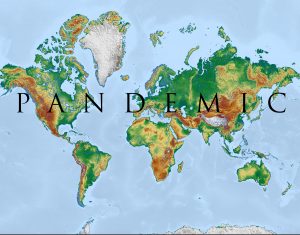Over the past two years we have been subjected to upheaval on every level of our lives. What we thought was stable, consistent, and taken for granted is not the case.
Unlike regional disasters the global pandemic is and will continue to affect every facet of life. To put it bluntly, our infrastructure is crumbling before our very eyes.
Everyday life has been affected on every level. Chip shortages which are used in the manufacture of computers, appliances and our vehicles are headline news. The transportation industry has taken a hit. Ports are clogged with ships waiting to unload goods. Illness has prevented workers from working in the agricultural fields and meat processing plants. Avian influenza (bird flu) has affected flocks in several states. In Kentucky alone 240,00 chickens tested positive and will be culled.

The global pandemic has affected our way of life.
Our dependence on other countries for our medications is often overlooked.
All one has to do is to look at the list of medication shortages facing our country right now. As of this writing there are 165 listed.
Our dependence on China and India for medicines

In July 2019 the U.S.-China Economic and Security Review Commission held a hearing on the United States’ growing reliance on China’s pharmaceutical products. In the discussion, Gary Cohn, then chief economic advisor to President Trump, argued against a trade war with China by invoking a Department of Commerce study that found that 97 percent of all antibiotics in the United States came from China. “If you’re the Chinese and you want to really just destroy us, just stop sending us antibiotics,” he said.
According to Dr Sakthivel Selvaraj, Director, Health Economics, Financing and Policy, at the Public Health Foundation of India (PHFI) New Delhi, India imports almost 80% of active pharmaceutical ingredients (APIs) and intermediates from China, which is huge and needs be reduced. These ingredients are used in the manufacture of over the counter and prescription medications. India imports these ingredients due to the fact the production cost is 20-30% less in China.
Some of the medicines India relies on Chinas API to manufacture are:
- Paracetamol (Tylenol)
- Ciprofloxacin (Cipro)
- Metformin (Glucophage)
- Acetylsalicylic acid (Aspirin)
- Ofloxacin (Floxin)
- Metronidazole (Flagyl)
- Ampicillin (Antibiotic)
- Amoxicillin (Antibiotic)
- Ascorbic acid (A form of vitamin C)
- Intermediates, on the other hand, are chemical compounds that are used in producing APIs.
In March 2020 India banned 26 drugs from export. A month later they lifted the ban on 24 of these drugs due to pressure from the U.S. At any time, a country could shut its export doors, due to political pressure, illness, transportation logistics, shortage of APIs or other reasons.
Will there be more medication shortages?
Given the fact that our dependence on vital, lifesaving antibiotics and other drugs is in the hands of other countries, until we can start to source and produce these medications in our country the outlook is very poor.
In addition, in response to the Cares act the National Academy of Sciences, Engineering and Medicine will conduct a study to examine the security of the medical product supply chain and provide recommendations. This study and implementation will take time. Our infrastructure will need a major overhaul to implement this.
This is a step in the right direction, however
What can we do?
Action Plan
- Get out your notebook and go to your medicine cabinet. Pull out all your creams, drops, supplements and any other treatments you have. Write them down. Start with prescription medications first. Check the amount and refills you have left. If this is a medication for a chronic conditions (Diabetic, high blood pressure, etc.) Do you have enough to get you by for a few months if supply chain is disrupted or totally collapses? When is your next appointment to get these medications refilled? If you are running low contact your medical provider and ask for a few months stock to have on hand in case of supply disruption.
- How are your other medical supplies stocked? If you are low on antibiotic ointment, burn cream, bandages, get those stocked as well.
- Be prepared. A well-stocked medicine cabinet with emergency antibiotics is a step forward in the right direction. Antibiotics can treat many infections before they become life threatening: Strep throat, skin infections, travelers’ diarrhea, animal bites, urinary tract infections, ear infections to name a few.
Be prepared. The hard fact is that our supply chain is disrupted, and it isn’t coming back anytime soon.
